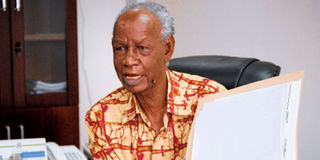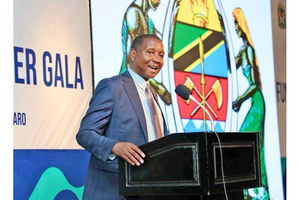Draft law exposes Tanzania in its border dispute with Malawi

The chairman of the Constitutional Review Commission (CRC), Judge Joseph Warioba, displays a copy of the draft constitution at a past press conference. Legal experts have cited serious ommissions in the draft law which jeopardises Tanzania borders. PHOTO | FILE
What you need to know:
- Misunderstandings between Malawi and Tanzania over Lake Nyasa border started when the later licensed foreign firms to undertake gas and oil exploration within the shared lake without involving the other partner.
Dar es Salaam. The draft constitution is compromising Tanzania’s stand in its dispute with Malawi over Lake Nyasa border. This is because the draft major law does not recognize water bodies as part of the United Republic of Tanzania.
Lake Nyasa, known as Lake Malawi by Malawians, has been the source of disagreements since colonial times, which were rekindled almost a year ago when Malawi licensed foreign companies to undertake gas and oil exploration in the lake.
This shocked Tanzania which maintained that is owns half of the Lake with Malawi insisting that the whole lake belongs to the southern Africa country.
The two countries have since engaged the Southern Africa Development Community (SADC) former leaders to resolve their misunderstandings.
But some people who have gone through the draft constitution released in early June have noted that the proposed major law does not recognise water bodies, Lake Nyasa being one of them, as part of the country.
This, they argue, might make Tanzania case against Malawi hard to defend if the major law is passed the way it is.
Section 2 of Chapter I of the draft constitution states: “The area of the United Republic is all area including the area of the sea and all the area of Zanzibar including its area of sea”. This description, according to legal experts, excludes lakes and rivers.
Speaking to The Political Platform this week, prominent lawyer Evod Mmanda said this is one of the many loopholes in the draft constitution which need to be addressed.
“Technically this means that rivers and lakes in the country are not part of Tanzania as the document specifically spells out seas, this means any other country like Kenya or Uganda can as well claim Lake Victoria being their area and win the case” he said.
Mr Mmanda said that the Constitutional Review Commission (CRC) ought to have been keener much as it just copied almost everything from the Kenyan Constitution.
He said the neighbouring country’s Mother Law has used a more general term of ‘all water bodies’ and not just specific on seas.
The same sentiments were shared by Legal and Human Right Centre (LHRC) Harold Sungusia, who admitted that the draft constitution needs a lot of improvements. “It is true that the section of the draft constitution does not include other water bodies as part of the United Republic of Tanzania and this is very serious omission,” he noted.
Historic dispute
Lake Nyasa as known to Tanzanians has been at the center of a historic dispute between the two countries.
Located at the junction of Malawi, Mozambique and Tanzania, Lake Nyasa – the eighth largest in the world – contains an estimated 168,000 tonnes of fish of nearly 1,000 species and is able to provide sustenance for nearly 600,000 people.
In the early 1960s, Malawi’s first President Hastings Kamuzu Banda claimed that Lake Nyasa was part of Malawi referring to 1890 Heligoland Agreement between Britain and Germany which stipulated that the border between the countries lay along the Tanzanian side of the lake.
This treaty was re-affirmed at the 1963 Organisation of African Unity summit where it was accepted reluctantly by Tanzania although disputes were reignited in 1967/18.
Malawi also alleges that the 2002 and 2007 African Union resolutions upheld the colonial agreement because of the emphasis on member states upholding the borders inherited upon independence.
Some, however, argue that it is necessary to correct the errors of the colonial powers and Tanzania has sought recourse to international law, which indicates that borders are generally in the middle of a body of water, claiming Tanzania should therefore own half the lake.
Quest for oil
The resurgence of the dispute began in October last year, when Malawi’s former President, Bingu wa Mutharika, awarded a contract to British Surestream Petroleum to start gas and oil exploration on the eastern part of the lake.
Since then, a number of disagreements over the use of the lake have arisen.
At the close of July, this year, Tanzania announced plans to purchase a new $9 million ferry to ply Lake Nyasa’s waters. Malawi’s ministry of Lands responded by claiming that Tanzania has no legal rights to start operating on Lake Malawi since the ownership and border dispute remains unresolved.
For their part, Tanzanian authorities argued that Malawian fishing and tourist boats were encroaching on Tanzania’s waters.
Hilda Ngoye, Special Seats MP for Mbeya Region, alleged that Malawi has been conducting tourism activities beyond its territorial waters, escalating tension further.
Tanzania’s Foreign Affairs and International Cooperation minister, Bernard Membe, requested that the exploration activities be shelved until discussions had been fully resolved, saying “any exploration or research activities for oil and gas prospects must stop forthwith as their presence was likely to jeopardise the ongoing negotiations and pose a security threat”.




